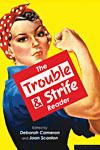Trouble & Strife (Reader)
type=digital_archives
Trouble and Strife was an independent radical feminist magazine published in Britain from 1983 to 2002 (as an English language sister-publication to the French journal Nouvelles questions féministes).
This new book, edited and with an introduction by former editorial
collective members Deborah Cameron and Joan Scanlon, collects together 30 of the best articles that appeared in the magazine, and also reproduces some of the cartoons which were one of its distinctive features. It contains sections on 'Controversies', 'Sexuality',
'Theory', 'History', and 'Culture'. Contributors include Dena Attar, Deborah Cameron, Christine Delphy, Stevi Jackson, Liz Kelly, Sigrid Rausing and Purna Sen.
The Reader like the magazine represents a particular, materialist
current in radical feminism which does not often feature in standard
anthologies: this will make it of interest to philosophers and historians of feminism, while the accessibility and continuing relevance of the contributions selected for the Reader will also make it a useful resource for teachers and students of women's/gender studies.
The Trouble and Strife Reader is available as a paperback book (an e-book with exclusive additional content will be available in 2010), and it can also be downloaded for non-commercial purposes free of charge from Bloomsbury Academic's website, http://www.bloomsburyacademic.com/current.htm
Do also check out the newly launched Trouble and Strife website, where we will be making the magazine's whole archive available over the next year, as well as putting up some new content and running a blog to which we invite all feminists to contribute posts and comments. The address is http://www.troubleandstrife.org
The legend which appeared on the magazine’s masthead throughout its life offers a succinct summary of its political position:
"Trouble and Strife is cockney rhyming slang for wife. We chose this name because it acknowledges the reality of conflict in relations between women and men. As radical feminists, our politics come directly from this tension between men’s power and women’s resistance."
Its political vocabulary emphasized ‘conflict’, ‘power’ and ‘resistance’, as is clear from the editorial in the first issue in 1983:
"We believe that men as a group benefit from the oppression and exploitation of women as a group. We do not see women’s oppression as secondary in importance to class or any other oppression; nor do we see it as produced by or maintained because of class or any other oppression. Although we recognize that women experience additional oppressions, particularly through race, ethnic origin, age, disability, class, and that these…may benefit and be contributed to by women who do not share them, all women are oppressed as women."

